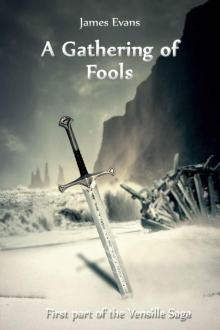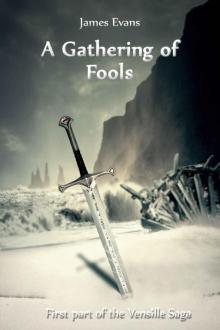- Home
- James Evans
A Gathering of Fools Page 6
A Gathering of Fools Read online
Page 6
“Hmm,” said Marrinek, “I might make do with gold for the time being. Silver I already have.” He patted his purse.
“Ah. Sir might find, if sir is counting on using the local shillings for his supply of silver, that the quality is rather low. The mint has cut the silver content in our coins to reduce the cost and the material is hardly better than copper for most purposes.”
“In which case I’ll take a pound of lead for the moment. I’ll be heading north tomorrow and I don’t want to be carrying gold with me. Wrap those things for me, if you would, and I will be on my way.”
Marrinek paid, gathered his purchases, nodded his thanks to Smyth and stepped out of the shop.
A little further down the street Marrinek found a stall selling leather goods. Almost on impulse he bought a wide belt, a large canvas backpack with tough leather fittings and straps, a wide-brimmed hat and a pair of gloves. He stuffed his new possessions, his purchases from Smyth and his bundled sword into the new backpack and slung the whole lot over his shoulder.
At the corner of the street he ducked into a bakery and bought a couple of loaves of bread and some fruit buns. From the shop opposite he bought a large piece of cheese, a brace of long spicy sausages, a bag of apples and some sort of meat wrapped in a heavy pastry. The food went into the bag alongside his other kit.
He paused to get his bearings then headed down an alley that should take him toward river. A twist took him on a narrower, darker path between overhanging buildings and he realised he may have taken a wrong turn.
There were fewer people here and more shadows and Marrinek wasn’t entirely surprised when someone stepped out in front of him and waved a knife in his face.
“Your money and your bag. Don’t make a fuss,” said the shadow, “there’s a good boy.”
Marrinek could feel the few people who had been visible in doorways or at the ends of the alley melting into buildings or back to the streets. He risked a glance over his shoulder - there were two more figures behind him, figures that were now looming, rather than melting.
“Right, right, but I don’t have much.” Marrinek held up his left hand then hooked the strap of the bag from his shoulder and threw it down on the ground between them. Then he shuffled the staff around till it rested on his shoulder before fishing in his pocket with his free hand.
“Please, just take it,” he said, pulling his purse from inside his shirt and tossing it toward the man in front of him, who moved quickly to snatch it from the air.
But not as quickly as Marrinek, who swung his staff over-arm and brought the end down hard on the mugger’s shoulder. There was a loud snap of breaking bone and the would-be mugger was driven to his knees, his knife forgotten, his face turning white with shock.
Marrinek stepped smartly forward and kneed his would-be assailant in the face, snapping his head back and knocking him to the ground. Turning, Marrinek got his right hand on the staff then thrust wildly at the nearer of the two figures who had come up behind him. The end of the staff caught him full in the face and blood splashed across the man’s face. The man dropped his knife and staggered backward, clutching at his broken nose as blood streamed down his chin and between his fingers.
The third man was big, well over six feet tall, and came forward hefting a long knife and trying to get close enough to use it. Marrinek stepped back then set his feet and moved the staff to mid guard to catch blade of the giant’s knife as it swung down. The staff flashed back to catch the giant’s jaw, snapping his head round, then Marrinek stepped back and swung the staff in a great arc, bringing it down hard on the giant’s head.
Marrinek stepped past the falling giant and struck the second man again, snapping ribs and driving him to the floor. He turned quickly back to the first mugger, who was struggling to his knees, and pointed the staff at him.
“I think I’ll take your purse. Pass it over.”
The mugger struggled to find his purse then threw it toward Marrinek, all thoughts of resistance washed away by the pain in his shoulder. Marrinek retrieved his backpack then took the mugger’s knife and purse from the dirt and found his own purse in the gutter, then looked down at the mugger still trying to get to his feet.
“Broken collarbone, possibly a broken shoulder blade. You should get that looked at. Now fuck off.”
He gestured at the man with his staff and waited till he was standing, then jerked forward as if he was going to strike again.
“Aargh,” said the mugger, as he fell back against the wall of the house behind him. He staggered back upright and stumbled off down the alley, glancing anxiously over his shoulder as Marrinek watched him go.
Marrinek turned back to the other two. The big man was obviously dead, head caved in and twisted to an unnatural angle. Marrinek ran his hands over the big man’s coat and relieved him of his purse and a thin knife, stuffing both into his bag. The other man was sitting against the alley wall, bleeding heavily from his broken nose and taking shallow breaths. He’d never win prizes for beauty again but Marrinek couldn’t bring himself to care.
As he turned to go, someone moved back along the alley where he’d entered from the street and Marrinek looked up sharply. Jenkins’ stable boy was standing there, watching with his mouth open. Marrinek snarled at him and the boy ran off between the buildings, ducking quickly around the corner. Marrinek let him go, checked he had all his things then walked off in the other direction.
He moved quickly now despite the burning in his arms and the terrible exhaustion, sticking to the main streets and heading back toward the town walls. Drawing attention by killing muggers had not been part of the plan and it wasn’t going to be long before someone came looking for him. He headed for the river; it was time to leave town.
Marrinek wandered the bank of the river looking for a barge to take him downstream to Vensille. Following the meandering river would be slow but it would give him time to plan and to think and in any case without a horse he had no real alternatives.
The river Guiln was already wide and slow by the time it reached Catshed. The wharves and docks, which all lay on the eastern bank of the river, were busy with barges unloading their cargoes and taking on new goods to be carried. Most would go downstream to Vensille, some would head upstream toward Riverbridge and the wild northern lands beyond.
Marrinek bought beer and roast meat from a stall overlooking the river and stood there for a few minutes watching the traffic and the trading. In an Imperial town, the trade would be regulated and controlled by the local customs officials but here everything happened informally at the wharf. Local merchants bought, sold and negotiated without a care for tax or tariffs and money changed hands quickly. It was busy and hot and noisy; Marrinek loved it.
He finished the heavily spiced roast meat - goat maybe, but it was difficult to tell - and threw the bone into the gutter. The wharves were busy with barges large and small, some carrying passengers, most taking only cargo. Marrinek pushed himself away from the wall and walked down to a barge that was just preparing to cast off from the wharf, having loaded cargos of seasoned hardwood and dried meat.
Marrinek hailed the man at the rudder.
“You heading to Vensille? Got room for a passenger?”
The man gave him a long look then nodded.
“Come aboard. Stand over there while we cast-off. There’ll be a price and we’ve no cabins for passengers so you’ll have to sleep on the roof.”
“That suits me fine.”
Marrinek threw his pack onto the roof of the barge and stepped across the narrow gap from the wharf. He stood there as the small crew cast-off the mooring lines, raised the sail and made ready to depart. With long poles, they slowly pushed the barge away from the wharf and out into the river then the wind filled the sail and they slid gracefully downstream.
“I’m Trant,” said the barge master once they had passed beyond the walls of Catshed, “and that’s my mate, Shaff.” He pointed at the woman working the tiller at the end of the barge.
<
br /> “Much obliged,” said Marrinek, “is there anything you need me to do?”
Trant looked at him, eyes narrowed against the sun.
“You know boats any?” he asked. Marrinek shook his head.
“Not really, no. I’ve been to sea but only as a, ah, passenger.”
“Then just keep out the way o’ the crew and mind what they tell you,” said Trant before he stalked off along the barge.
Marrinek spent most of the day sitting on the roof watching the countryside as they floated serenely along the river. Once underway the crew busied themselves with minor tasks but by early evening the Master was happy and the crew made themselves comfortable on the foredeck. Marrinek ate alone on the roof, ignored by everyone else on the vessel, listening to the crew laughing and joking as they took turns to pilot the barge.
Around mid-afternoon, with Catshed firmly behind them and no visible signs of pursuit, Marrinek took up his staff and opened the roll of charming tools. Traditional charm-maker’s tools were named after their shapes and sizes and these were no different. The five tools had their names inscribed along their lengths; Needle, Quill, Twig, Chisel and Blunt.
Now that he had time, tools and resources he could work on the staff. He turned it around, examining the wood. The ash was plain, a bit mucky from walking through the town, scarred and marked from the tools and weapons it had encountered.
He took the staff in one hand and picked up the largest tool, Blunt, in the other. Then he closed his eyes and concentrated on the wood until he could see the grain and feel and understand its underlying biological structure. He focussed power through Blunt - and the feeling of charmed power flowing freely and uninhibited after so many months of imprisonment and restriction was intoxicating - and with deft touches he began to alter the very fabric of the wood itself, giving it the strength and resilience of high-grade steel and subtly altering its shape to better fit his hands and purpose.
As the power flowed and Blunt roved over its surface, the wood shifted and twisted as Marrinek played with its basic physical properties, thinning here, thickening there, lengthening a little, hardening everywhere. The bottom end he drew into a short, cone and hardened even further, pouring in power until the tip was tough enough to dent stone.
He fixed the imperfections in the wood’s structure, addressed the weaknesses that might have caused the staff to break or fracture, straightened the slight kink two-thirds of the way along its length, smoothed the tool marks left by knife and the impact damage done by fighting. He tuned the wood to his touch, irrevocably linking the weapon to his hand; for him, and for him alone, it would feel barely half its true weight, allowing him to spin, strike and block, faster and harder than anyone would expect. For other talented practitioners, the staff would feel unnaturally heavy and would be impossible to wield effectively; the untalented would feel nauseous if they got too close to the staff and most would not even be able to touch it.
The final touch, as dusk darkened towards evening, was to change the staff’s colour to a deep, dark green and to give the surface a gentle shine. Eventually he surfaced from his work, releasing Blunt from its labours and stretching his cramped fingers and arms. The staff lay in the last of the evening sun, a different shape and colour, tougher and harder than any natural wood, stronger and more robust than any steel.
As evening became night the master emerged from his cabin and lamps were lit fore and aft and amidships. In their pale glow the barge continued slowly down the wide river, following the light from another barge some way ahead. Marrinek shifted toward the front of the boat so that he sat in the light of one of the lamps. There he ate a second lonely meal before working again through the staff-fighting forms.
Sometime around midnight the barge finally drew up at a small quay alongside other river boats. The crew tied up, dropped the sail and, in minutes, everything was calm. All the lamps were extinguished except the one under which Marrinek, alone again now that the crew had retired, still sat at the front of the barge, cross-legged with his staff before him.
He stretched his neck and unpacked his tools again to begin the next stage of work on the staff. First, he took four of the foot-long rods of iron and used Blunt to join them into a single, continuous length. Then he picked up Twig and began to work his way along the rod, chipping away imperfections just as he had done with the wood of the staff until he had a perfectly straight, clean, smooth piece of featureless iron.
He switched back to Blunt and focussed more power into the rod, changing its shape to elongate it into a thin wand almost as long as the staff. He checked the length against the wood then switched to Needle, the smallest of the five tools. Starting at one end of the iron he began to focus power through the tool, directing it to alter the structure of the iron in a particular way. After an hour’s work, he was happy with the structure of the metal at one end of the wand; in ways he couldn’t quite explain the new metal just felt right and he knew that it would work the way he needed it to work.
He picked up Blunt again and paused, preparing himself to channel the prodigious quantities of power that were necessary for the next stage of the job. He placed Blunt against the patterned end of the wand and balanced the far end on the railing of the barge, pointing out across the river towards the trees on the far bank. Then he took a deep breath and began to push huge quantities of power into the tool. Nothing happened for several seconds except that the tool grew rapidly hotter but as the power built the iron started to hum and then, suddenly, there was a whoosh and a boom burst across the river, shattering the peace of the night.
Marrinek dropped the now hot charm and splashed water on the singed skin of his hand; his hands were tough, calloused from long work with sword, staff and charm, but any longer and he’d have suffered a serious burn. He smiled to himself, inspecting the wand under the light of the lamp as the crew and master boiled up onto the deck, shouting to each other and trying to work out what was going on.
The crews of the other barges were also awake and lamps were being lit across the vessels tied up at the small wharf. Eventually, with no sign of death or danger, the crews went back to bed and quiet descended again on the river. The master gave Marrinek a filthy look before descending the stairs to the lower deck having clearly decided that his passenger was at the heart of whatever was going on.
Marrinek waited until all was quiet and then ran his hand over the wand, inspecting his work. The iron, still smooth to the touch, now had an intricate pattern spiralling along its surface; it was no longer recognisable as the raw iron he had bought in Catshed and in the pale light from the lamps it almost seemed more liquid than metal. Satisfied, he set it down on the floor, trapping it under his leg so that it couldn’t roll away.
He turned back to the staff itself, holding it in both hands and focussing his will upon it, concentrating until he could see the grain and understand the very nature of the wood. He used Quill to open the staff, working the wood to create a channel along the length of the staff. Into this he placed the iron so that one end was flush with the top of the staff and the other finished maybe eight inches from the pointed end. Then he worked Quill again to bind the iron to the wood, leaving the channel open to the night air.
At the bottom of the staff he fashioned another chamber into which he fitted the lead, stretching and sculpting it so distribute its weight as evenly as possible in the lower portion of the staff. Then he sliced the lead into a dozen pieces, flowing the wood between them so that each was separated from its neighbours.
He paused and stretched his neck and back to relieve some of the aches he had accrued from too long sitting on the deck of the barge. It had been a long time since he had worked like this and the effort was taking its toll. He shook his head and picked up the copper wire and the switch units, turning them over in his hands as he stared at the iron wand now embedded in the ash.
It took Marrinek another hour to build the switch circuit that linked the lead that would form the power reservoir to
the iron wand. The copper wire was fiddly to work in the dim light of the lamp and Marrinek struggled to hold his temper as he worked the soft metals. Eventually, he managed to get everything connected so that both the switch units and the slide panels were mounted almost flush to the surface of the wood where they would fall easily under his fingers as he held the staff.
Satisfied that the circuit was good, he used Twig to close the channel, burying the copper wires, the wand and the reservoir within the wood, forcing the wood to flow seamlessly so that its natural grain was restored and only a small amount of the lead was still visible.
Then he used Twig to shape the copper ingots, pulling them into two long thin plates, each a foot long and half an inch wide. He laid these carefully on the floor then used Quill to open two narrow channels in the surface of the staff, one near the lower end, just above the point where the iron rod ended, and a second two-thirds of the way up the staff.
He laid each of the copper plates into a channel, one after another, using more copper wire to link the plates back to the reservoir, then he used Quill to bring the wood back, closing the gaps and securing the plates. More power flowed and the copper changed, just a little, to protect it from the effects of water and sweat and dirt. Then he changed focus to toughen the metal, working until it was more like hard steel than soft copper. He rapped the transformed copper with Quill and nodded to himself, grinning quietly in the dark. Then Quill closed the gaps in the wood and sealed the plates in the surface.
He stretched again and ate some more bread. The night was quickly passing and if he didn’t finish soon he would still be working when dawn arrived. He sighed and picked up the length of fine copper netting, wrapping it gently over the surface of the staff and joining the ends so that it formed a continuous sleeve stretching from one end to the other and broken only by the plates, the switch units and the slide panels.

 The Royal Marine Space Commandos- RMSC Omnibus
The Royal Marine Space Commandos- RMSC Omnibus Guerrilla
Guerrilla Commando
Commando Gunboat
Gunboat A Gathering of Fools (Vensille Saga Book 1)
A Gathering of Fools (Vensille Saga Book 1) A Gathering of Fools
A Gathering of Fools Zombie Destruction: Love in the Age of Zombies Book Three
Zombie Destruction: Love in the Age of Zombies Book Three